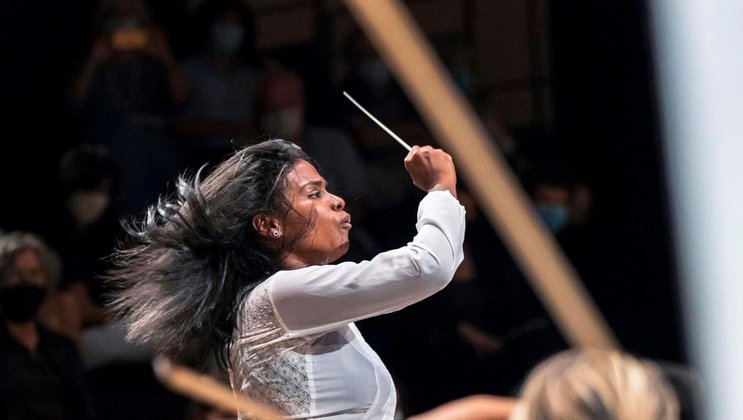"I'm Black, female, and Latina: I have a great combination!"
Discussing Diversity with Glass Marcano
-
Glass Marcano
Glass Marcano was born in Venezuela. She started her musical studies within the National System of Youth and Children’s Orchestras and Choirs of Venezuela (El Sistema) at the age of four. After studying Law at the Central University of Venezuela, in 2015, she started to study conducting, and a year later, she began studies at the National Experimental University of the Arts.
Thanks to her abundance of energy on the podium, and the passion, love and vigor that characterize her, in 2018 Marcano was appointed Director of the Simón Bolívar Conservatory of Music’s Youth Symphony Orchestra. In 2019 she was selected as one of 12 finalists to participate in the 1st edition of the La Maestra Competition, reaching the semi-final and receiving the Orchestra Prize. She is currently continuing her studies at the Conservatoire à rayonnement régional de Paris. She has recently conducted the Orchestre Symphonique Région Centre-Val de Loire/Tours, Gulbenkian Orchestra, Bogota Philharmonic Orchestra, Paris Mozart Orchestra and Le Balcon, and participated in Les Victoires de la Musique 2020, conducting the Orchestre national de Lyon.
In 2020, you won the Prix de l’Orchestre at the "La Maestra" Competition. Do you feel it is important to offer such competitions aimed exclusively at female conductors?
Yes, without a doubt I think that this type of competition offers great visibility for all talented female conductors, regardless of their age. I think that "La Maestra" in its first edition had a very important impact on the music scene. It is the first time in history that a competition involving only women conductors has taken place. This was the right time to do this and to start something that marks a "before" and "after."
After your victory there, you moved from Caracas to Paris. What is the biggest difference between the live music situation in these two places?
Yes, it has been very much a complete change to move from life in Caracas to life in Paris. I think I've skipped a lot of steps!! Maybe I would have made two or three stops before arriving in Paris, but life surprises you, hahahahah!
The biggest difference would be the energy and passion with which we musicians in Venezuela interpret each work of each composer. This is something special about Venezuela.
Each place is very interesting, but living here in Paris is really a great fortune, for its culture in general, especially music: there is a great musical power in this city. I think my biggest challenge is to adapt and learn as much as I can here in Europe, but without losing my essence, what I am spiritually, and what characterizes me.
You work not only with many youth orchestras but with ensembles such as the Paris Mozart Orchestra. How is conducting an "adult" orchestra different from one composed of very young musicians?
In my opinion, from the experience I have had with youth and adult orchestras, you need the same professionalism for both orchestras (the main objective being to make good music), but I think you must have a different attitude, since youth orchestras have a more extroverted energy than adult orchestras. You have to know how to handle both kinds of energy. I think the conductor’s sympathy and respect for both sides creates an atmosphere that satisfies the musicians and makes them feel that you are giving your best for a good result. That helps to strengthen the bond you must have with both kinds of orchestra.
Several Black musicians we interviewed for this series talked about the importance of creating welcoming spaces for everyone. Have there been situations where you did not feel welcome – either because of your gender or because of your ethnicity – and how can we as a festival ensure that we provide the best possible environment for you?
Yes, I think it is quite common for us to witness such situations. I have experienced some in my country. But here in Europe it has been different. Perhaps it is because the idea of seeing Black conductors of classical orchestras is not so common, and even more so to see, as in my case, someone who is Black, female, and Latina: I have a great combination. The important thing is the result that must emerge from our performances, especially during the festival.
In the end it is not about color, gender, or social status. The goal is that when you are at a concert and close your eyes, you can listen to good music and feel pleasure from it, and that it is not appearance that dictates musical quality.
By sharing and spreading more information via social networks about the makeup of the Chineke! Orchestra and my own background, I hope to inspire many people who may not feel included and allow them to see that everything is possible and that the important thing in life is dedication and a good heart.
The concert you will be conducting with the Chineke! Junior Orchestra at Lucerne Festival on 9 August 2022 features works by two Black composers. What can the audience look forward to in this program?
They can look forward to great music. The orchestra and I will together make sure the audience enjoys the performance thanks to the heart as well as the solid technique we put into it in the concert hall. We will work hard to do so and with God’s help we will achieve it. You know, it's not a matter of gender, it's not a matter of color. It’s simply good music, so enjoy it!
